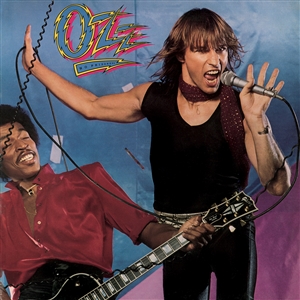catalogue
OZZ
NO PRISONERS (ROCK CANDY)

format:
1 CD
release:
02.08.2019
label:
ROCK CANDY
item ID:
135069
Special Limited Deluxe Collector's Edition / Fully Remastered Sound shaped from 24 BIT digital technology / Classic underground 70s hard rock nugget / 12-page full colour booklet - 3,000 word essay and enhanced artwork.
WHEN IT COMES to tough no-nonsense hard rock then you'd have to look long and hard to find an album better than 'No Prisoners' by Ozz.
Stuffed full of top riffs, killer songs and impressive vocals it certainly made its mark on the hard rock cognoscenti despite a lack of sales and relative obscurity.
Even now, the album is given appreciative nods and familiar knowing smiles from those who have heard it.
Indeed, the lack of mainstream attention seems to have given it almost mythical status in a world where praise is heaped upon even the most inconsequential records currently in circulation.
Ozz was initiated by two hugely talented individuals: Chicago born guitarist Gregg Parker and vocalist Minnesota raised Alexis T.
Angel. Parker had established something of a reputation for himself backing a number of musicians and leading a recording band by the name of The Infernal Blues Machine who released an album on the London label in 1976.
Despite his high profile and musical ability it wasn't until he met Angel a few years later that sparks really began to fly.
The two decided to form Ozz as a vehicle that would crystallise their desire to harness the rampant energy of Led Zeppein and Aerosmith.
Issued in 1980 on the Epic label and produced by British whiz-kid Andy Johns (Led Zeppelin, Free, Hughes Thrall) the album is a blistering collection of red-hot hard rock leaning heavily on the Plant/Page and Tyler/Perry call and response axis.
Songs such 'Sail On', 'Hungry Love' and 'Given' Up On Love' lead the way but there is not one weak track on this record which in itself is a major victory.
Why the album failed to attract even a modicum of commercial recognition at the time is a major mystery.
WHEN IT COMES to tough no-nonsense hard rock then you'd have to look long and hard to find an album better than 'No Prisoners' by Ozz.
Stuffed full of top riffs, killer songs and impressive vocals it certainly made its mark on the hard rock cognoscenti despite a lack of sales and relative obscurity.
Even now, the album is given appreciative nods and familiar knowing smiles from those who have heard it.
Indeed, the lack of mainstream attention seems to have given it almost mythical status in a world where praise is heaped upon even the most inconsequential records currently in circulation.
Ozz was initiated by two hugely talented individuals: Chicago born guitarist Gregg Parker and vocalist Minnesota raised Alexis T.
Angel. Parker had established something of a reputation for himself backing a number of musicians and leading a recording band by the name of The Infernal Blues Machine who released an album on the London label in 1976.
Despite his high profile and musical ability it wasn't until he met Angel a few years later that sparks really began to fly.
The two decided to form Ozz as a vehicle that would crystallise their desire to harness the rampant energy of Led Zeppein and Aerosmith.
Issued in 1980 on the Epic label and produced by British whiz-kid Andy Johns (Led Zeppelin, Free, Hughes Thrall) the album is a blistering collection of red-hot hard rock leaning heavily on the Plant/Page and Tyler/Perry call and response axis.
Songs such 'Sail On', 'Hungry Love' and 'Given' Up On Love' lead the way but there is not one weak track on this record which in itself is a major victory.
Why the album failed to attract even a modicum of commercial recognition at the time is a major mystery.




